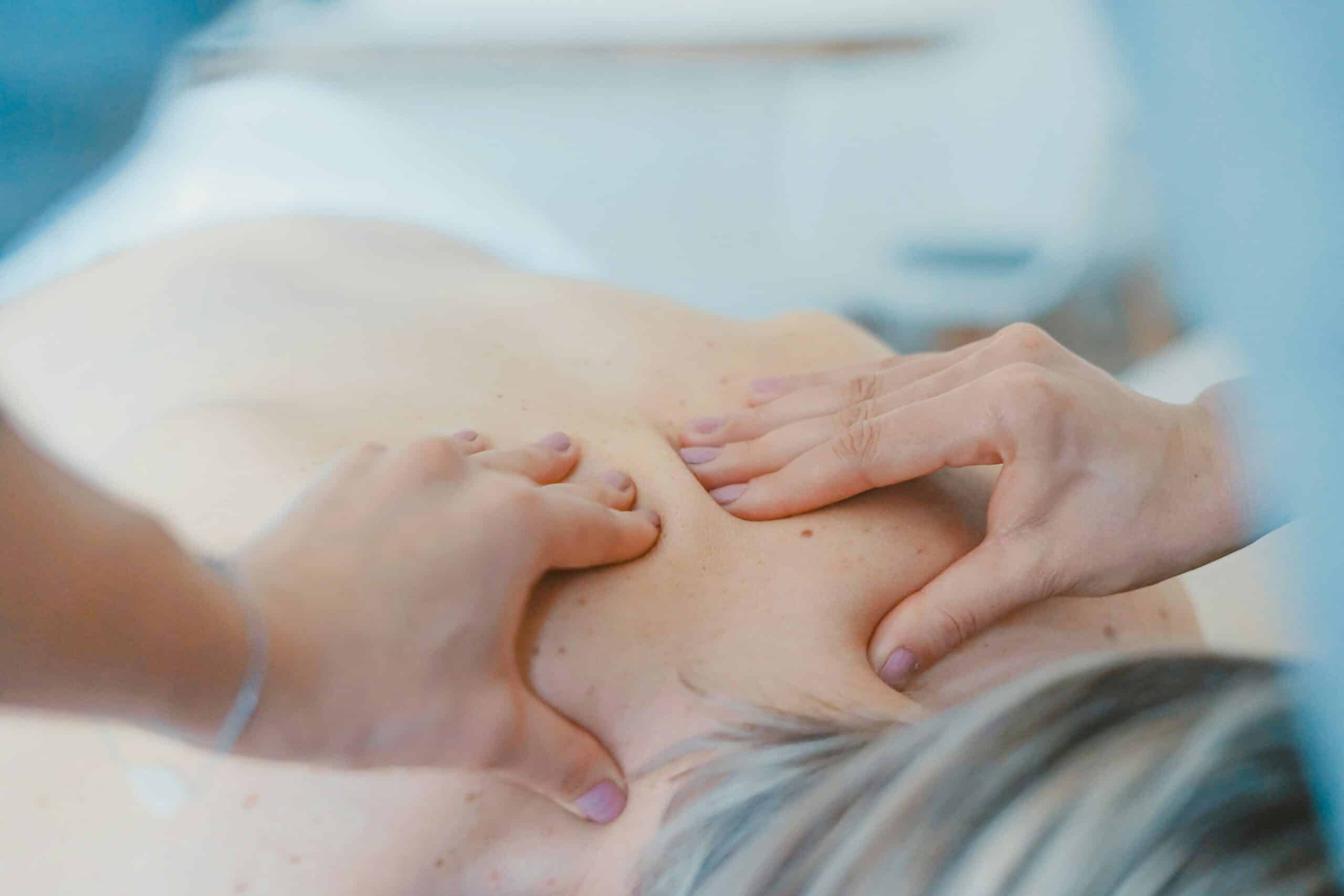Vagus Nerve Strengthening Heals and 5 WAYS TO STRENGTHEN YOUR VAGUS NERVE to soothe during perimenopause and menopause.

Vegas has slot machines and all-you-can-eat buffets, but your vagus nerve is better for (and essential to) your digestion, gut health, metabolism and brain function. And when your vagus nerve is strong, you’ll feel as if you’ve won a million bucks.
Recently I started changing up my long warm steamy shower routine to strengthen my vagus nerve. At the end of my shower, I flip it as cold as the water will go for at least 20 seconds. (Or, the alternative is jumping into an ice bath. My track-running son swears by it.) And why would I want to do this? Ever? Yes, it sounds like torture, but it is surprisingly addictive!
Undoubtedly, a hot/cold shower is one of the many simple daily ways to improve your health and reduce inflammation by stimulating your vagus nerve. Your vagus nerve extends from your brain to your bowls and back up again, connecting your gut and brain. And it’s one of the most important nerves in your body as it connects with major organs through nerve endings. Importantly, this nerve pathway is a superhighway you can strengthen to improve your health and happiness.
What is Your Vagus Nerve?
Your vagus nerve is the parasympathetic nervous system’s longest and most complex nerve, which controls rest, relaxation, and digestion. And it is comprised of both motor neurons that carry motor signals to the organs and sensory neurons that carry information back to your brain.
How Does Strengthening Your Vagus Nerve Affect Digestion and Metabolism?
Your vagus nerve plays a significant role in the digestive process, helping to regulate metabolism and digestion. It does this by releasing certain hormones which assist gut activity, leading to improved digestion. For example, stimulating the vagus nerve increases the production of stomach acid, which may improve digestion and reduce symptoms associated with Irritable Bowel Syndrome. Also, your vagus nerve affects the movement of contents through and out of your GI tract, called motility. When you are under stress, your body does not see motility as a priority and slows down.
Additionally, your vagus nerve regulates appetite by signaling fullness to your brain. Also, it is the main pathway for ghrelin (your hunger hormone). So, if you have trouble overeating or never feel full without eating too much, strengthening your vagus nerve will provide significant relief. And relatedly, your vagus nerve also affects energy levels by maintaining balanced blood sugar levels.
How Does Vagal Stimulation Affect Brain Health?
Also, studies have demonstrated that stimulating your vagus nerve can benefit your brain health. This benefit happens because stimulating your vagus nerve increases the activity of neurons necessary for learning and memory. In addition, stimulation of the nerve may reduce inflammation in the brain and protect against neurological diseases such as Parkinson’s and Alzheimer’s disease.
Other Potential Benefits of Strengthing Your Vagus Nerve
Other potential benefits of promoting vagal activity are increased immunity, stress relief, improved nutrient absorption and improved mood. Additionally, it may support balanced immune function by reducing inflammation and helping the body better regulate its immune responses. Also, a strong vagus nerve helps stimulate vitamin B12 intake and other nutrient absorption. Finally, stimulating the vagus nerve can help people better manage stress and feel calmer by helping lower cortisol levels.
How to Know if Your Vagus Nerve Needs Strengthening
The best way to determine your vagal tone, which is the strength of your vagus nerve, is by your heart rate variability (HRV). HRV is the amount of time between your heartbeats. Variability is what you want, not consistency (1). Higher HRV signals a better vagal tone. Some devices like the Oura Ring and the Whoop Band track your HRV. Other signs of a robust vagal tone are an overall sense of well-being, good stress resilience and healthy and regular bowel movements.
5 Ways to Strengthen Your Vagus Nerve
Stimulating the vagus nerve activates your parasympathetic nervous system (your “rest and digest” response). Engaging in activities that strengthen the vagus nerve disrupt the response of the sympathetic nervous system (your “fight or flight” response). Pick and choose from these 5 ways to strengthen your vagus nerve, or try them all.
1. Hot/Cold Therapy
Hot/Cold therapy helps increase resilience to stress by training and strengthening the signaling in your vagus nerve. The temporary stress here is the shock of going from hot to cold water (which is not the same as unhealthy chronic stress). And it supports the body’s ability to transition between the sympathetic and parasympathetic nervous systems, which aids you in not getting stuck in the constant “flight or flight” response.
So, for hot/cold therapy, you can go to a spa with hot and cold plunge pools. How to: Immerse your body in warm water for at least five minutes. Then quickly transition to cold water for at least 20 seconds. Also, there is the do-it-at-home approach, which I do: take a hot shower for at least 5 minutes (that’s the easy part) and then quickly turn the cold water as cold as it goes and stand there for at least 20 seconds.
And here are two tips on how I transitioned from hot-only showers to hot/cold therapy: I first started with cold water on my back only. Also, I began with semi-cold water and increased the coldness over time.
And a quicky hot/cold therapy is to rinse your face with cold water right after a hot shower.
2. Laughter and Fun
Make a habit of adding fun and laughter to your life. Laughter stimulates the vagus nerve and positively affects your heart rate. (2) So spend time with those who make you laugh, watch funny television movies or see a stand-up comic. And fake it till you make it. Even when you don’t feel like laughing, if you fake it, your facial expression and body movements will send signals to your brain that it can’t ignore. So, you’ll be laughing for real in no time. Also, other ways to increase positive emotions include meditation and spending time in social situations.
Additionally, activating your vocal cords in other ways such as through signing, humming or chanting, can stimulate the vagus nerve. Join a choir, sing in the shower, hum along with the car radio, or combine movement and singing as I do by dancing and singing in my living room.
3. Breathing Exercises
Also, breathing exercises increase your HRV. Here are two for you to try:
Alternate Nostril Breathing
Here’s a simple breathing exercise you can do anywhere to strengthen your vagus nerve:
• First, press your right thumb on the outside of your right nostril to close it off while you inhale through your left nostril.
• Second, while you hold your breath, use your right ring finger to close off your left nostril while removing your right thumb from your right nostril. Then exhale through your right nostril.
• Third, while keeping your ring finger on your left nostril, inhale through your right nostril.
• Fourth, holding your breath, switch fingers again, putting your right thumb on the outside of your right nostril and remove the ring finger from your left nostril. Then exhale through your left nostril.
This series is one set; repeat for 5–10 sets.
Deep breathing with longer exhales.
With the exhale being a little longer, slowly and fully inhaling and exhaling each breath helps slow down the body and combat stress. Also, this stimulates the vagus nerve and activates the parasympathetic nervous system. But you can’t breathe like this all the time, so use this practice when you find yourself stressed. Additionally, setting aside scheduled time for deep breathing, even just 5–10 minutes, can relax your nervous system and lower your stress levels.
4. Gentle movement
Furthermore, walking or doing yoga or tai chi gently moves the body and stimulates the vagus nerve through calming exercise. (3) I’m a big fan of yoga, and I also aim for 10,000 steps per day (or its equivalent in other exercise). Yoga and tai chi, in particular, increase vagal tone due to the movement/breath combination.
Try these yoga poses: 3 minutes of forward bends, gentle backbends, holding your legs up against the wall for 20 minutes or 5 sun salutations.
5. Supplemental Support to Strengthen Your Vagus Nerve
Turn up your body’s healing power by supporting your vagus nerve and parasympathetic nervous system with these supplements: (all found at myyl.com/christie-kelemen)
Probiotics
First, try probiotics. It has become increasingly clear that improving gut bacteria improves brain function by affecting the vagus nerve. (4)
Omega-3 Fatty Acids
Next, try Omega-3 supplements. Researchers have discovered that omega-3 fatty acids increase vagal tone and vagal activity. (5)
Magnesium
Then, try magnesium. Promoting a sense of calm and optimal sleep patterns can also support the vagus nerve. Magnesium naturally relaxes the body.
Essential Oils
Finally, try essential oils. Together lime essential oil and clove oil stimulate your vagus nerve. Apply 1 drop lime oil with a touch of clove oil, mixed in a carrier oil such as V-6, to your vagus nerve, behind your ear lobe on one or both ears.
Purchase all of the above supplements at myyl.com/christie-kelemen
Vagus Nerve Strengthening Conclusion
Your vagus nerve is the parasympathetic nervous system’s longest and most complex nerve, which controls rest, relaxation, and digestion. Strengthening your vagus nerve aids digestion, metabolism, brain health, immune health, reduces inflammation and elevates mood. Pick and choose from these 5 ways to strengthen your vagus nerve, or try them all. 1. Hot/Cold Therapy, 2. Laughter and Fun, 3. Breathing Exercises, 4. Gentle Movement, 5. Supplements
For more great support for your vagus nerve check out these articles:
Stress: How To Relieve it to Ease Your Mind & Body
Benefits of Ginger Tea & Lemon Ginger Tea Recipe
What Should I Eat to Be Healthy? Confused?
Soothing Self-Care Ideas for Women Who Do Too Much
This blog post is for informational and educational purposes only. It is not intended to treat any health condition or to be prescriptive for anyone. Always be sure to work with your healthcare practitioner before making any changes.
Footnotes:
1) Shaffer F, Ginsberg JP. An overview of heart rate variability metrics and norms. Front Public Health. 2017 Sep 28;5:258. DOI: 10.3389/fpubh.2017.00258. PMID: 29034226. PMCID: PMC5624990.
2) Effect of Laughter Yoga on Mood and Heart Rate Variability in Patients Awaiting Organ Transplantation: A Pilot Study pubmed.ncbi.nlm.nih.gov/22894892 “Effect of Laughter Yoga on Mood and Heart Rate Variability in Patients”
3) Howland, R. H. (2014). Vagus nerve stimulation. Curr Behav Neurosci Rep 1(2), 64–73. pubmed.ncbi.nlm.nih.gov/24834378 “Vagus nerve stimulation.”
4) Probiotics may help boost mood and cognitive function – Harvard Health
(5) Omega-3 Polyunsaturated Fatty Acids and Heart Rate Variability – PMC (nih.gov)
Other resources:
Kok, B. E., Coffey, K. A., Cohn, M. A., Catalino, L. I., Vacharkulksemsuk, T., Algoe, S. B., . . . Fredrickson, B. L. (2013). How positive emotions build physical health: Perceived positive social connections account for the upward spiral between positive emotions and vagal tone. Psychol Sci 24(7), 1123–1132. doi.org/10.1177/0956797612470827 “How positive emotions build physical health: Perceived positive social connections account for the upward spiral between positive emotions and vagal tone.”
Vagus Nerve Stimulation: A New Promising Therapeutic Tool in Inflammatory Bowel Disease doi.org/10.1111/joim.12611 “Vagus Nerve Stimulation: A New Promising Therapeutic Tool in Inflammatory Bowel Disease”
The Vagus Nerve and the Inflammatory Reflex – Linking Immunity and Metabolism dx.doi.org/10.1038/nrendo.2012.189 “The Vagus Nerve and the Inflammatory Reflex – Linking Immunity and Metabolism”
Neuroanatomic and Clinical Correspondences: Acupuncture and Vagus Nerve Stimulation doi.org/10.1089/acm.2012.1022 “Neuroanatomic and Clinical Correspondences: Acupuncture and Vagus Nerve Stimulation”
Stay in the know and get on-going vital tips and tricks for your health by subscribing to The Easy Anti-Inflammatory Newsletter below. As a bonus you will also receive your 9 Healthier Habits for a Healthy You Guide.






